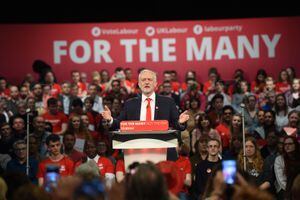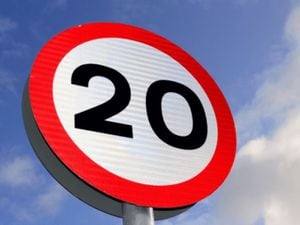Jeremy's still standing as Tories fail to deliver knockout
Just 10 days to go. The bell is sounding for the final round. And Jeremy Corbyn is still in the ring.

Yes, despite everything the Tories have thrown at the Labour leader, they have not landed a knockout punch.
He's been portrayed as a bearded old leftie, an unreconstructed 1980s socialist, a unilateral nuclear disarmer, and soft on the IRA.
That's our Jeremy.
So what do the Tories have to do?
It could be that they have been aiming too high. Theresa May only called the election in the first place because she assumed Mr Corbyn was already lying prostrate on the canvas.
Some Labour grandees seemed resigned to throwing in the towel even as the campaign began. His poll ratings were at such historic lows that they were shaking their heads in despair.
The dynamics of this general election have been like none in living memory, and Jeremy Corbyn has been a Labour leader like none in living memory.
He is more of a Chairman Corbyn, with his little red book (the Labour manifesto), and ideological sidekick John McDonnell, aka The Undertaker.
His loyal audience is almost entirely outside the Westminster bubble. Twice he was elected by the rank and file, and the enthusiasm he has brought to the grass roots has been noticeable out on the stump, where he has plainly energised his supporters.
Being an underdog is generally a good thing in sport, as people root for you, but not so in politics, because the reason you are an underdog in the first place is that nobody is seriously considering voting for you.
But Mr Corbyn has a secret weapon. As he has not pretended to be anything that he is not, confronting him with things that he believes, and has always believed, has not had the damaging effect that it might have had on a politician who has made a career of trying to change his or her spots.
It is a form of sincerity and conviction, rather like Margaret Thatcher. Well, obviously not at all like Margaret Thatcher, but sticking to what he believes against opposition and derision in a somewhat similar manner.
After the temporary suspension of campaigning in the wake of the terrible events of Manchester - which incidentally caused the abandonment of his planned visit to Ironbridge - his first act was to make a critical speech about the war on terror which risked being, and was, controversial.
Underdog status brings with it psychological advantages. It means that Theresa May could win, and yet still lose, while Jeremy Corbyn could lose, yet still win.
In other words, anything less than the resounding triumph which had seemed on the cards at the start of the campaign will be a failure for Mrs May. For Jeremy Corbyn, every Labour seat over the 200 mark - the figure mentioned by Len McCluskey before he rediscovered his optimism mojo - will be a little victory, and moving into coalition territory would be dreamland.
Key moments of the campaign so far?
THE DIANE ABBOTT INTERVIEW
A shambles, but one from which Labour learned a lesson. Every party fears a "Gordon Brown incident" - that is, a loose word or departure from the script which destroys everything and dominates everything. Labour got it out of the way early in the campaign and, as it was Diane Abbott, it hardly counted anyway. After that, no more winging it in live interviews.
THE TORY MANIFESTO CLANGER
Full of broad-brush policies, a desire to get back to Brexit, and few costings, the media and political opponents nevertheless found a little nugget in the manifesto which was decidedly not gold. Tory candidates felt an immediate doorstep backlash to the social care proposals, and Mrs May even felt a bit of the heat on the doorstep herself. With the issue threatening to poison the rest of the Tories' campaign, it was time for a U-turn.
THE LABOUR MANIFESTO
Tax and spend, tax and spend, without disguise or shame. A red blueprint for the future, a document without compromise. It was billed as being radical and responsible, with lots of figures to say where the money would come from. But the analysts and commentators said the numbers didn't add up anyway.
It was controversial and upset a lot of people - all the people that Labour manifestos would be likely always to upset. In contrast, the Tory manifesto upset a lot of people that the Tories wouldn't want to upset.
STRONG AND STABLE
Strong and stable. Strong and stable. Stable and strong. You can only say it so many times in so many different ways before people start to get bored with it, and after that you risk parody and ridicule. After the first weeks, the Tories were in need of a new slogan.
TEN MORE DAYS
As Harold Wilson would have said if we'd gone decimal, 10 days is a long time in politics.
The defining moments of the 2017 general election may yet be to come.





